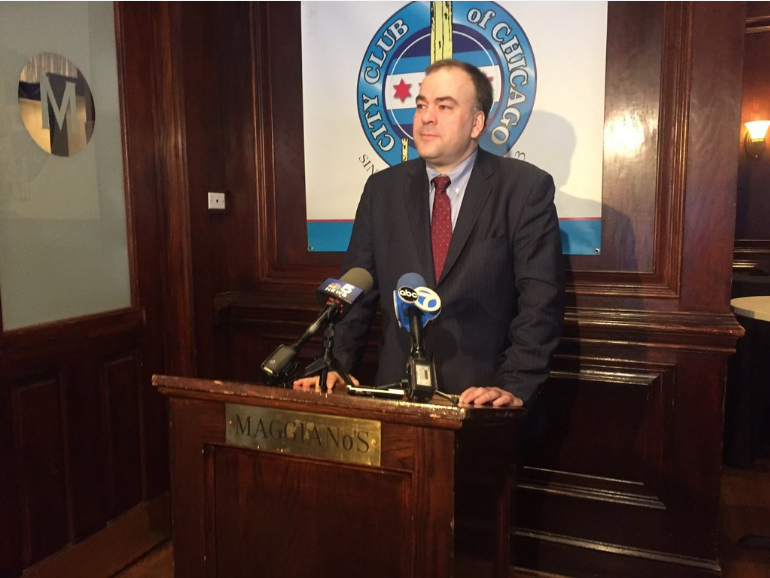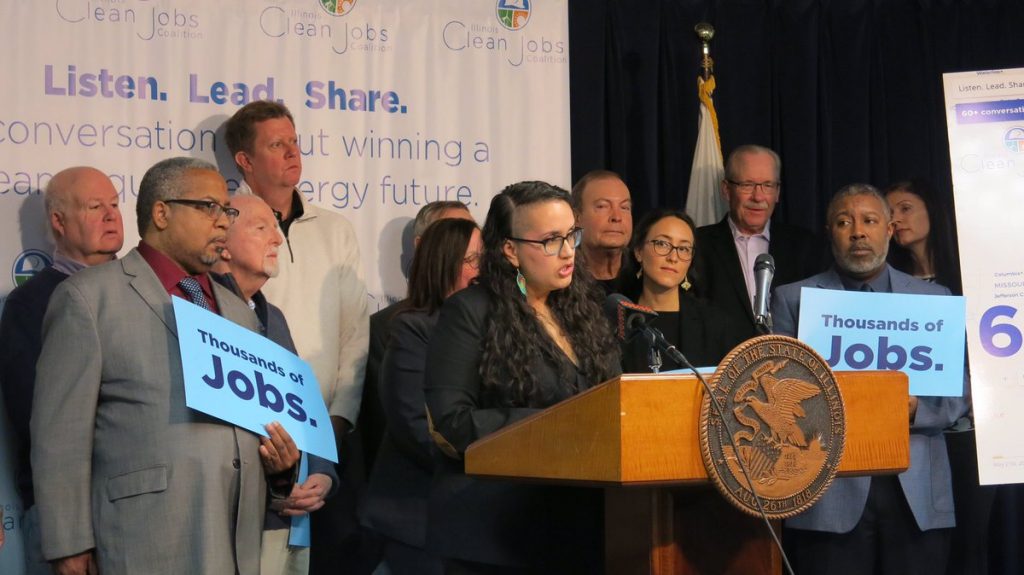-
A bill designed to give assessors more information about the value of commercial properties championed by Cook County Assessor Fritz Kaegi cleared the Illinois Senate Thursday — one day after drawing opposition from the Civic Federation. Another bill that would require schools to teach about consent as part of sexual education courses also advanced.
-
Will the third time be the charm for those working to end mayoral control of Chicago’s schools?
Chicagoans would be represented by an elected — not appointed — school board, under a measure approved by an Illinois House vote of 110-2.
Similar measures were approved by the Illinois House in each of the last three years — before stalling in the face of opposition by Mayor Rahm Emanuel and former Gov. Bruce Rauner. -
When Zach Koutsky heard his wife’s doctor tell her to avoid handling store receipts to prevent her baby from being exposed to poisonous chemicals, Koutsky realized the common item posed a serious health threat.
Most traditional retail receipts are printed on heat-sensitive paper, which do not use ink but instead trigger a chemical reaction between Bisphenol A, known as BPA, or bisphenol S, known as BPS, and the paper.
Scientists have long known BPA can mimic estrogen when it enters the human body, disrupting hormone levels, as well as reportedly contributing to diseases like diabetes, asthma and cancer.
Koutsky said his wife’s doctor said “[She] shouldn’t touch movie theater receipts, parking tickets, airplane boarding passes.” So Koutsky, the legislative and political director for the United Food and Commercial Workers Local 881, began snatching the receipts at the check-out counter.
But Koutsky soon realized he could be putting himself at risk.
“And who do I represent?” Koutsky said of his work for UFCW. “People who touch hundreds of these a day.”
HB 2076, sponsored by freshman State Rep. Karina Villa (D-West Chicago), would ban the use of BPA-lined receipts in Illinois.
-
Cook County Assessor Fritz Kaegi struck back Wednesday at the Civic Federation for “misleading” lawmakers after the organization publicly opposed a bill designed to give assessors more information about the value of commercial properties.
-
A bill that would give the Cook County Assessor’s office — and other offices statewide — the ability to collect operating income and expense data from commercial properties, instead of having to guess at the valuations, is set for a Senate vote this week, and could come as soon as Wednesday.
 Assessor Fritz Kaegi addresses reporters. [A.D. Quig/The Daily Line]
Assessor Fritz Kaegi addresses reporters. [A.D. Quig/The Daily Line]
-
In a month marked by deadlines to get bills out of committee, the Senate last week passed a bill unanimously — with relatively little fanfare — that would satisfy both calls for criminal justice reform and for a more focused approach to solving the growing problem of retail theft.
-
The latest entry in The Daily Line’s occasional bill tracker is an amendment to SB 958 from state Sen. Dan McConchie (R-Hawthorn Woods), who wants state officials to take a page from Chicago in getting axel-destroying potholes filled fast.
-
The Illinois Chamber of Commerce on Thursday filed its own proposed capital bill Thursday — just one week after the International Union of Operating Engineers Local 150 filed their own bill out of frustration with Gov. JB Pritzker’s office.
 A city crew patches a pothole. [Quinn Ford, DNAinfo Chicago]
A city crew patches a pothole. [Quinn Ford, DNAinfo Chicago]
The chamber’s plan is focused on “horizontal” projects — as in roads and bridges — which is similar to Local 150’s plan. The chamber’s plan aims to raise about $2 billion per year.
-
After a series of bills dealing with complicated energy issues emerged in the first half of the Spring legislative session, there is a movement to combine them all into one major package to make them palatable for the highest number of lawmakers.
 The Clean Energy Jobs Act would move Illinois to 100 percent renewable energy by 2050. [Illinois Clean Jobs Coalition]
The Clean Energy Jobs Act would move Illinois to 100 percent renewable energy by 2050. [Illinois Clean Jobs Coalition]
-
Former state worker Mark Janus, the plaintiff in the U.S. Supreme Court case that struck down compulsory “fair share” union fees last summer, is continuing his quest for $3,000 in union fees AFSCME Council 31 had collected before the June ruling.
Do you like this page?











